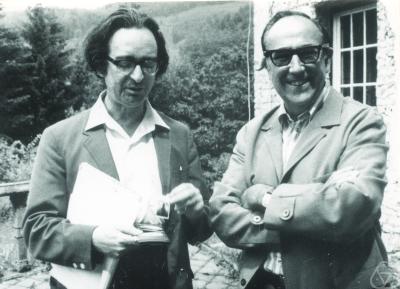<Back to Index>
- Mathematician Frank Harary, 1921
- Tango Composer Ástor Pantaleón Piazzolla, 1921
- 2nd Prime Minister of Malaysia Tun Abdul Razak bin Hussein Al-Haj, 1922
PAGE SPONSOR
ΕΚΛΟΓΕΣ 2012
Τυπώστε και Ψηφίστε


Frank Harary (March 11, 1921 – January 4, 2005) was a prolific American mathematician, who specialized in graph theory. He was widely recognized as one of the "fathers" of modern graph theory.
Frank Harary was born in New York City, the oldest child to a family of Jewish immigrants from Syria and Palestine. He earned his Bachelor's and Master's degrees from Brooklyn College in 1941 and 1945 respectively and his Ph.D. from University of California at Berkeley in 1948. During 1948 - 1986 he was with the University of Michigan. From 1987 he was Professor (and Distinguished Professor Emeritus) in the Computer Science Department at New Mexico State University in Las Cruces. He was one of the founders of the Journal of Combinatorial Theory and the Journal of Graph Theory. He died at Memorial Medical Center in Las Cruces.
Harary's work in graph theory was diverse. Some topics of great interest to him were:
- Graph enumeration, that is, counting graphs of a specified kind. He coauthored a book on the subject (Harary and Palmer, 1973). The main difficulty is that two graphs that are isomorphic should not be counted twice; thus, one has to apply Polya's theory of counting under group action. Harary was an expert in this.
- Signed graphs. Harary invented this branch of graph theory, which grew out of a problem of theoretical social psychology investigated by the psychologist Dorwin Cartwright and Harary.
- Applications of graph theory in numerous areas, especially to social science. He was co-author of John Wiley's first eBook, Graph Theory and Geography.
Among over 700 scholarly articles Harary wrote, two were co-authored with Paul Erdős, giving Harary an Erdős number of 1. He lectured extensively and kept lists organized alphabetically continuously from A to Z of the names of the cities where he spoke.